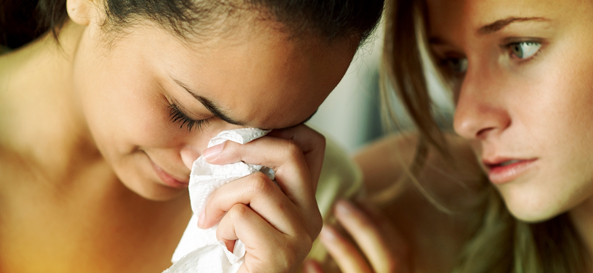
In the past, I’ve never known quite what to do or say when a friend or loved one had been diagnosed with cancer. But then I was diagnosed with cancer myself—twice. Over the past three years, I’ve been treated with two rounds of chemotherapy and several surgeries. I’m thankful that I’m finally healthy again, and I’m thankful for what I learned along the way.
Here are some lessons I learned about how to talk to and treat a friend or loved one who’s recently been diagnosed with a serious illness. Of course, everyone is different, so these ideas may not work for everyone, but they’re lessons I hope to use when they seem appropriate.
Ask how you can help
Let your friend know that you’re there for them and want to help. Sometimes you’ll feel like you’re making an empty offer because you feel powerless to help. There will be opportunities where you can assist in practical ways, though, and even just knowing that you care and you want to help will be a blessing.
Help even if not asked
Some people have a hard time asking for help. That can be especially true for a person who has recently been diagnosed with a serious illness. It’s hard for someone who previously was self-reliant to start asking for help because it acknowledges he may no longer be able to do things he use to do. Jump in and find ways to help even if you’re not asked. Bring meals. Mow his yard. Clean her house. Offer to take the kids to a playground or to a movie. That type of help can be much appreciated when someone needs time to get medical tests, go to doctor’s appointments and discuss options with their husband or wife.
Ask how they’re doing
Asking a person recently diagnosed with cancer how they’re doing might seem like a cruel questions. I almost expect them to snap back, “How do you think I’m doing?” Of course they’re doing badly, so why ask? The truth, however, is that every day is different for someone diagnosed with cancer, both because of new test results, which can be encouraging or discouraging, and because of the roller coaster of emotions launched by a diagnosis. It’s not cruel to ask a cancer patient how they’re doing; it’s a sign that you care. If it still seems too insensitive, make your questions more specific: “How are you doing today?”
Let them be angry and upset
Romans 12:15 says, “Rejoice with those who rejoice; mourn with those who mourn.” It’s normal to be upset and maybe even angry at the news of a life-debilitating disease. Let them be angry or upset for a while without telling them to be more positive about it. Telling them to be positive or to be brave will likely only add to their guilt.
Interestingly, 56 of the 150 Psalms are prayers of lament, demonstrating that God wants us to bring Him our frustrations and concerns, not just get over them instantly. Sometimes the best way to demonstrate God’s love and concern is to listen without judging.
During my trial with cancer, I visited a doctor who said I’d need rods in my spine after getting a tumor removed. He said I’d lose some of my mobility, that the surgery was difficult and that I might even lose the ability to walk. Needless to say, I was frustrated. I was angry and vented loudly and profanely on the ride home. My very loving, very wise wife used that car ride as a time to listen, care and pray. If she had advice to offer at that moment, she wisely knew to wait for better timing to offer it.
Don’t give unsolicited advice
Don’t give advice unless your friend asks for it. You probably can’t fully understand what they’re going through, so the best thing you can do is be a good listener.
Don’t be afraid to say, “I don’t know”
In the past, I’ve always been afraid that someone going through something like this would ask me the questions they’re inevitably wondering: “Why this? Why me? Why now?” The good news is that you don’t have to have all of the answers. Lots of well-meaning Christians are too quick to point to Romans 8:28: “And we know in all things God works for the good of those who love him, who have been called according to his purpose.” We’re too quick to try to point out the good that could come even out of a bad situation. Just acknowledge that it is a bad situation, let your friend know that you’re there for whatever they need, and pray that God will help them get through this and trust Him even when they don’t understand.
Keep your sense of humor
I think my sense of humor was better when I was sick than it ever has been. It’s important to keep things in perspective and maintain the ability to laugh. Be normal with your friend, and don’t be afraid to laugh with him. Proverbs 17:22 reminds us, “A cheerful heart is good medicine.”
Call and visit
Sometimes I’ve been afraid to call someone with a bad diagnosis. “What if it’s a bad time? What if I’m just bothering him?” Just about everyone has caller ID these days, so if it’s a bad time, they won’t answer. But even so, they’ll see that you called and will likely be blessed to know that you cared. Don’t be afraid to call or stop by. Wouldn’t you rather risk being a bit intrusive than risk communicating (even unintentionally) that you don’t care?
Don’t tell dead people’s stories
When I was first diagnosed with cancer, over and over well-meaning folks told me about relatives who died of cancer. It’s normal and natural to think of someone else you know who’s had a similar diagnosis, but there’s no need to blurt out their story—especially if it had a bleak outcome. Believe me, anyone diagnosed with cancer is already considering the potentially fatal outcome, and they don’t need to hear about your great uncle Bert who died of cancer at that particular moment.
Ephesians 4:29 explains that we should speak “only what is helpful for building others up according to their needs that it may benefit those who listen.” Your great uncle Bert’s story doesn’t fit that criteria. There may be a good time to tell his story, but it’s not now.
Pray
God hears our prayers—regardless of how He chooses to answer them. In prayer, we are drawn closer to Him and closer to each other. And sometimes, He delivers people from sickness and disease.
When I was diagnosed with cancer the second time, my doctors pretty much gave me a death sentence. My cancer came back after chemo, which meant I had a strain of cancer that didn’t respond to chemo. Radiation wasn’t an option, either. The doctors said they’d try more chemo but that I shouldn’t expect much. Their only good news was that I was in bad enough shape to qualify to stay in the Hope House treatment facility.
Yet it would seem God had other plans for me, and as far as I can tell, I’m 100 percent healthy today. I get tested every six months, and so far there’s no sign of it returning. Because of my diagnosis, I’m certainly more thankful for my kids, wife, job and health than I ever was before. Now, I don’t have to go to work—I get to go to work. And the same is true for everything else I do each day. What a blessing it is to learn to enjoy even the seemingly mundane things in life.
Whether your friend is reeling from an unexpected diagnosis or in the middle of a long haul fighting a disease, your friendship can lift them up during some of their darkest days. At least, that’s what my friends and family did for me.





















